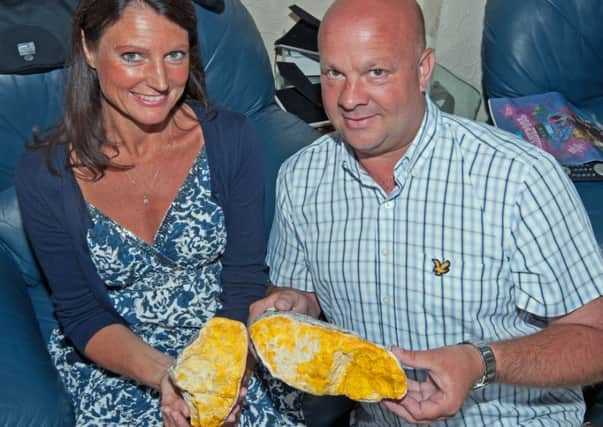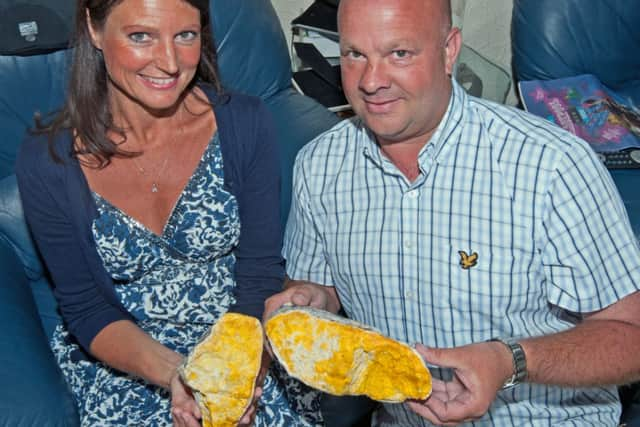VIDEO: A whale of a find!


The hardened substance is suspected to be ambergris – a matter formed in the gut of sperm whales.
It is used in perfumes and is said to be very valuable because it’s so rare.
Advertisement
Hide AdAdvertisement
Hide AdAnd Sandra Johnson thinks she and her friend Neil Martin may have found two lumps of it while walking her dogs on the beach at South Shore last week.


She said she wouldn’t have known what it was until last year, when Morecambe man Ken Wilman made headlines for discovering a 3kg lump of what was thought to be ambergris on his local beach. He was offered £43,000 for it by a French dealer.
Miss Johnson, a school nurse, said: “Ever since we saw the report of this man we’ve joked that we might find some here.
“We never thought for a minute we’d find some.”
But when Miss Johnson’s Jack Russell Suzie returned from the shore covered in a yellow substance, she began to wonder. “At first I thought it was pollen, so I went to wash it off her,” she said.
Advertisement
Hide AdAdvertisement
Hide Ad“But as we walked further down the beach I saw this bright yellow rock shining in the sun. I realised that must have been the substance Suzie rolled in further on the beach, so I went to have a look.
“Even though it was a nice day, the sand looked to have been churned up with a lot of debris on it, like there had been a rough tide. Among it was this amber rock. It was really strange stuff, and then it came back to me about this man in Morecambe.”
By this time, Mr Martin had joined Miss Johnson, of Squires Gate. He researched the find on the internet and said images and information he found were the same as their discovery made on the sands near to the Mirror Ball.
The pair decided to hunt for the piece Suzie had been attracted to opposite Blackpool Pleasure Beach.
Advertisement
Hide AdAdvertisement
Hide AdTaxi driver Mr Martin, 45, of Carmont Court, South Shore, said: “It’s really bizarre stuff.
“It’s waxy and you can break bits off it, like a hard cheese, and it does smell. It was quite strong at first, but the older it gets the sweeter it becomes.
“But it’s exactly the same as the stuff Ken Wilman was holding in his hand when he was in the papers.”
The substance collected on Blackpool beach looks like a rock which has been split, revealing a waxy yellow and white interior. It gives off a rather pungent odour.
Advertisement
Hide AdAdvertisement
Hide AdSome reports say ambergris is passed through the stomach of sperm whales and is excreted.
Marine biologists believe the substance is produced in the abdomen of the whales to help them digest hard matter like the beaks of giant squid.
If the Blackpool find is verified it could be a lottery win.
But despite its striking similarities to ambergris, Miss Johnson and Mr Martin are remaining realistic, and say they could very well be holding on to 2.2kg of rubbish.
Advertisement
Hide AdAdvertisement
Hide AdRecent reports say finds of ambergris could well be palm oil, a biofuel, washed up from ships. It led to dogs becoming sick in recent cases.
However, a simple test with a hot needle – as recommended by experts – suggests the pair may have stumbled across the elusive ambergris.
Mr Martin reported seeing a puff of smoke when the needle was pressed into it.
He said: “It melted and turned an oily colour. It’s not entirely conclusive – sometimes it was more brown and others it was black – but smoke came out.”
Advertisement
Hide AdAdvertisement
Hide AdMiss Johnson added: “If it turns out to be nothing we’ve not lost anything. But if it’s something we could be going on a cruise!”
What experts have to say about subject
A marine expert today described the Blackpool find as “interesting” and said it included colours consistent with past finds of ambergris.
The Gazette sent David McGrath, Sustainability Manager at the Solaris Centre, images of the couple’s find on Blackpool beach.
He said: “It’s a big piece and interesting.
“I can’t see the outer surface too well but there are hints of white and speckly. A friend of mine has some which is the size of a small bar of soap.”
Advertisement
Hide AdAdvertisement
Hide AdBut he added, despite its appearance, it could also be palm oil – which poses a threat to dogs.
There have been cases of dogs becoming gravely ill after getting too close to palm oil, with one report of a dog dying in Cornwall.
It has also washed up frequently in Anglesey, North Wales and the coasts around Merseyside from ships
A bit like ambergris these lumps are greyish white on the outside, but they are bright yellow inside.
References to ambergris in history
Advertisement
Hide AdAdvertisement
Hide AdFor centuries ambergris has been imbued with wonderful properties.
The ancient Chinese called it ‘dragon’s spittle fragrance’ and used it to spice their wine, believing it to be an aphrodisiac.
In the Middle Ages, it was burned as incense and as a preventative against plague.
In Milton’s Paradise Lost, Satan tempts Christ with ‘Grisamber steamed’. Aristocrats of the Renaissance wore it moulded, dried and decorated as jewellery.
Advertisement
Hide AdAdvertisement
Hide AdCharles II used to eat it with his eggs, rather in the way an epicure might now shave truffle over an omelette. Sailors, with readier access to the stuff, had a more prosaic use for it... they employed it as a laxative.
Ten facts about ‘whale vomit’
Ambergris is a solid, waxy, flammable substance of a dull grey or blackish colour produced in the intestines of sperm whales
It’s produced by the whale to protect its gut from the very sharp beaks of squid that it feeds on deep down in the ocean
Although called ‘whale vomit’, it is probably excreted rather than vomited
It is excreted hundreds of miles away from land
It can float on the ocean for years before washing ashore
Advertisement
Hide AdAdvertisement
Hide AdYears of exposure to the sun and salt water transform the waste into a smooth, grey, lump of compact rock which has a waxy feel to it
Freshly produced ambergris has a marine, fecal smell and as it ages, it acquires a sweet, earthy scent
It got its name because it looks like the amber washed up on beaches in the Baltic. Gris comes from the Latin word for grey
It is used in the production of perfume and as a result is extremely valuable
Advertisement
Hide AdAdvertisement
Hide AdScientists refer to ambergris as “floating gold” because of this
Other ambergris cases
Ken Wilman was stunned to learn that the unusual ‘stone’ his dog uncovered on Morecambe beach was believed to be a piece of rare and valuable whale vomit. A French dealer offered Mr Wilman 50,000 euros for the find. Mr Wilman’s boxer Madge found the lump while they were out walking on the beach. Mr Wilman said: “It was like walking on the beach and finding a bag of £50,000 in cash.” It is believed he still owns the find after the stash couldn’t be verified.
Charlie Naysmith, eight, discovered a 600 grams solid piece of sick after taking a stroll along Hengistbury Head, near Bournemouth in August 2012.
In March 2008, beachcombers Sean Kane, 24, and Ian Foster, 39, found 110lb of whale vomit washed up on the beach in Wales. Sean, from Penrhyndeudraeth in North Wales, said the pair were on the beach walking a dog at nearby Criccieth when they made their discovery.